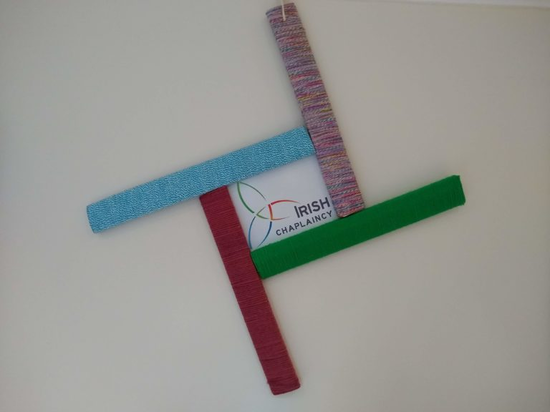St Brigid: A Saint For Our Times
February 1, 2022 Blog
When the Irish Chaplaincy decided to adopt St Brigid as its patron saint back in 2011, the choice was well made. Some people wondered about the wisdom of adopting a saint from so far back in time, but in truth, the decision could not have been better. Brigid of Kildare ("Mary of the Gael") may have lived in the fifth century, but she was a woman well ahead of her time. Far from being a figure consigned to folklore, she emerges as someone who has much to say to us today about such contemporary issues as church governance, work for peace and justice, gender equality, care for the earth, as well as the contemplative life.
The bare facts of her life are soon told. She was born near Dundalk, Co Louth, in 452, the daughter of parents who were baptised by St Patrick with whom she developed a close friendship. Despite receiving many offers of marriage, she became a nun and with seven others settled at Croghan Hill in Co Meath.
Sometime around 470, Brigid moved to Cill Dara (Kildare) where she founded a "double monastery" (one for men and one for women), over which she ruled as abbess. She appointed St Conleth as bishop, and between them they governed the church there by means of a mutually happy alliance, establishing a practice which was to last for centuries of a double line of abbot-bishops and of abbesses, with the abbess of Kildare as the "first among equals".
Given today's controversies surrounding issues of equality over women priests/bishops, we surely have much to learn from this model of governance in the early Celtic church. Brigid died at Kildare in 525, leaving behind a cathedral city and school that became famous throughout Europe.

Whatever about the many legends and myths surrounding her name, Brigid emerges as a strong and gentle woman, a powerful leader, a skilful healer and wise spiritual guide. She has become for many a potent symbol of Christian womanhood, showing us in different ways the feminine face of God.
What makes her particularly relevant for us today is the range of issues she embraced and the manner in which she dealt with them. She was a peacemaker who intervened in disputes and brought about healing and reconciliation. One story tells of her giving away her father's precious sword to a poor man so that he could barter for food to feed his family, thus transforming a weapon of war into a life-giving instrument. She practised hospitality and had a special concern for the poor and marginalised.
In Brigid's life the active and contemplative lived in harmony. She was no stranger to hard work and there are stories of her milking cows, shepherding her sheep, helping with the harvest and even brewing the ale! But she was also a woman of contemplation, given to long hours of prayerful reflection from which she drew her spiritual strength, confidence and courage.
In keeping with Celtic traditions, Brigid was wonderfully attuned to the seasons and cycles of nature. It is no accident that today many individuals and groups concerned about the environment and our treatment of the planet, draw inspiration from the reverence and respect which she had for the wonder of creation. In so many ways, Brigid was centuries ahead of her time!
Far from being a figure lost in the mists of folklore and myths, St Brigid, the patroness of Ireland, is a saint whose life has relevance for us today as we confront the great issues in our society and our world. Truly, a woman for our times and the obvious choice for patron saint of the Irish Chaplaincy.

